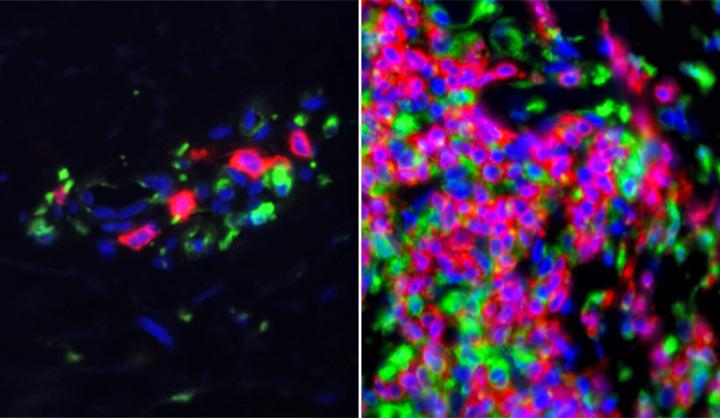
Credit: (Image credit: Chen Lab)
In the last decade, scientists discovered that blocking a key regulator of the immune system helped unleash the body’s natural defenses against several forms of cancer, opening up a new era of cancer immunotherapy. Now Yale scientists have essentially flipped this script and found that when impaired a molecularly similar regulator can cause the damaging immune system attacks on skin and organs that are the hallmark of the autoimmune disease lupus, they report Dec. 11 in the journal Science Translational Medicine.
The study results help explain the origins of lupus and suggest novel ways researchers might be able to restore function of this inhibitor and provide much needed new therapy to treat the disease, the scientists said.
The immune system has a series of regulators designed to prevent it from attacking tissues in its host, a system that goes awry in autoimmune diseases. Yale researchers found that mice lacking an immune system inhibitor called programmed death-1 homolog, or PD-1H, spontaneously developed symptoms that resemble two forms of lupus — systemic, in which the immune system attacks multiple organs; and cutaneous, which is marked by pronounced skin deformities.
“This molecule is clearly involved in inhibiting lupus, but it seems to be selective because it does not have the same effect in several other autoimmune diseases,” said senior author Lieping Chen, the United Technologies Corporation Professor in Cancer Research, and professor of immunobiology, dermatology, and medicine.
PD-1H is molecularly similar to the more commonly known PD-1 molecule, which also helps suppress immune system response. Chen was a pioneer in identifying and developing inhibitors to PD-1, which freed T cells to attack several forms of cancer. Several labs have also tried to use PD-1H as a cancer treatment but so far have been unsuccessful.
Chen said his findings suggest that in people with lupus the function of PD-1H is critical. When it is impaired, they are vulnerable to the immune system attacks on skin and multiple organs that are the hallmark of the disease.
Lupus patients currently have very limited options for treatment, but the new findings suggest a novel approach called protein fusion might mimic PD-1H and help control the immune system and combat the disease, Chen said.
###
The research was primarily funded by Boehringer Ingelheim, which had investigated PD-1H as a potential cancer treatment, and by a United Technologies endowment.
Yale’s Xue Han and Matthew Vesely are co-lead authors of the study.
Media Contact
Bess Connolly
[email protected]
Related Journal Article
http://dx.




